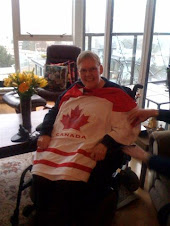From Go Pro

View from my living room
Sunday, May 27, 2012
Monday, May 21, 2012
Grief has become familiar to me
David Kessler & Elisabeth
Kübler- Ross working on the
five stages of grief
On Grief and Grieving is Elisabeth Kübler-Ross’s final legacy, one that brings her life’s work profoundly full circle.
On Death and Dying began as a theoretical book, an interdisciplinary study of our fear of death and our inevitable acceptance of it. It introduced the world to the now-famous five stages: denial, anger, bargaining, depression and acceptance. On Grief and Grieving applies these stages to the process of grieving and weaves together theory, inspiration and practical advice, all based on Kübler-Ross and Kessler’s professional and personal experiences.
Elisabeth Kübler-Ross & David Kessler
Denial, Anger, Bargaining, Depression and Acceptance
The stages have evolved since their introduction and they have been very misunderstood over the past three decades. They were never meant to help tuck messy emotions into neat packages. They are responses to loss that many people have, but there is not a typical response to loss as there is no typical loss. Our grief is as individual as our lives.
The five stages, denial, anger, bargaining, depression and acceptance are a part of the framework that makes up our learning to live with the one we lost. They are tools to help us frame and identify what we may be feeling. But they are not stops on some linear timeline in grief. Not everyone goes through all of them or in a prescribed order. Our hope is that with these stages comes the knowledge of grief ’s terrain, making us better equipped to cope with life and loss.
Denial
This first stage of grieving helps us to survive the loss. In this stage, the world becomes meaningless and overwhelming. Life makes no sense. We are in a state of shock and denial. We go numb. We wonder how we can go on, if we can go on, why we should go on. We try to find a way to simply get through each day. Denial and shock help us to cope and make survival possible. Denial helps us to pace our feelings of grief. There is a grace in denial. It is nature’s way of letting in only as much as we can handle.
As you accept the reality of the loss and start to ask yourself questions, you are unknowingly beginning the healing process. You are becoming stronger, and the denial is beginning to fade. But as you proceed, all the feelings you were denying begin to surface.
Anger
Anger is a necessary stage of the healing process. Be willing to feel your anger, even though it may seem endless. The more you truly feel it, the more it will begin to dissipate and the more you will heal. There are many other emotions under the anger and you will get to them in time, but anger is the emotion we are most used to managing. The truth is that anger has no limits. It can extend not only to your friends, the doctors, your family, yourself and your loved one who died, but also to God. You may ask, “Where is God in this?
Underneath anger is pain, your pain. It is natural to feel deserted and abandoned, but we live in a society that fears anger. Anger is strength and it can be an anchor, giving temporary structure to the nothingness of loss. At first grief feels like being lost at sea: no connection to anything. Then you get angry at someone, maybe a person who didn’t attend the funeral, maybe a person who isn’t around, maybe a person who is different now that your loved one has died. Suddenly you have a structure – - your anger toward them. The anger becomes a bridge over the open sea, a connection from you to them. It is something to hold onto; and a connection made from the strength of anger feels better than nothing.We usually know more about suppressing anger than feeling it. The anger is just another indication of the intensity of your love.
Bargaining
Before a loss, it seems like you will do anything if only your loved one would be spared. “Please God, ” you bargain, “I will never be angry at my wife again if you’ll just let her live.” After a loss, bargaining may take the form of a temporary truce. “What if I devote the rest of my life to helping others. Then can I wake up and realize this has all been a bad dream?”
We become lost in a maze of “If only…” or “What if…” statements. We want life returned to what is was; we want our loved one restored. We want to go back in time: find the tumor sooner, recognize the illness more quickly, stop the accident from happening…if only, if only, if only. Guilt is often bargaining’s companion. The “if onlys” cause us to find fault in ourselves and what we “think” we could have done differently. We may even bargain with the pain. We will do anything not to feel the pain of this loss. We remain in the past, trying to negotiate our way out of the hurt. People often think of the stages as lasting weeks or months. They forget that the stages are responses to feelings that can last for minutes or hours as we flip in and out of one and then another. We do not enter and leave each individual stage in a linear fashion. We may feel one, then another and back again to the first one.
Depression
After bargaining, our attention moves squarely into the present. Empty feelings present themselves, and grief enters our lives on a deeper level, deeper than we ever imagined. This depressive stage feels as though it will last forever. It’s important to understand that this depression is not a sign of mental illness. It is the appropriate response to a great loss. We withdraw from life, left in a fog of intense sadness, wondering, perhaps, if there is any point in going on alone? Why go on at all? Depression after a loss is too often seen as unnatural: a state to be fixed, something to snap out of. The first question to ask yourself is whether or not the situation you’re in is actually depressing. The loss of a loved one is a very depressing situation, and depression is a normal and appropriate response. To not experience depression after a loved one dies would be unusual. When a loss fully settles in your soul, the realization that your loved one didn’t get better this time and is not coming back is understandably depressing. If grief is a process of healing, then depression is one of the many necessary steps along the way.
Acceptance
Acceptance is often confused with the notion of being “all right” or “OK” with what has happened. This is not the case. Most people don’t ever feel OK or all right about the loss of a loved one. This stage is about accepting the reality that our loved one is physically gone and recognizing that this new reality is the permanent reality. We will never like this reality or make it OK, but eventually we accept it. We learn to live with it. It is the new norm with which we must learn to live. We must try to live now in a world where our loved one is missing. In resisting this new norm, at first many people want to maintain life as it was before a loved one died. In time, through bits and pieces of acceptance, however, we see that we cannot maintain the past intact. It has been forever changed and we must readjust. We must learn to reorganize roles, re-assign them to others or take them on ourselves.
Finding acceptance may be just having more good days than bad ones. As we begin to live again and enjoy our life, we often feel that in doing so, we are betraying our loved one. We can never replace what has been lost, but we can make new connections, new meaningful relationships, new inter-dependencies. Instead of denying our feelings, we listen to our needs; we move, we change, we grow, we evolve. We may start to reach out to others and become involved in their lives. We invest in our friendships and in our relationship with ourselves. We begin to live again, but we cannot do so until we have given grief its time.
At times, people in grief will often report more stages. Just remember your grief is an unique as you are.
Friday, May 11, 2012
Thursday, May 3, 2012
Please help me find a cure
Tuesday, May 1, 2012
Quest Diagnostics Announces C9orf72 Genetic Test for ALS (Lou Gehrig's Disease)
The company's Athena Diagnostics business unit to unveil the new test at the American Academy of Neurology Annual Meeting this week in New Orleans
MADISON, N.J. and WORCESTER, Mass., April 25, 2012 /PRNewswire via COMTEX/ -- Quest Diagnostics DGX +1.89% , the world's leading provider of diagnostic testing, information and services, today announced a new genetic testing service from its Athena Diagnostics business unit, a leader in neurology diagnostics, for amyotrophic lateral sclerosis (ALS), also known as Lou Gehrig's disease.
It is the first clinically available testing service for detecting hexanucleotide repeat expansion in the C9orf72 gene. Research published in the April 2012 issue of The Lancet found that this C9orf72 mutation was present in up to 39% of familial (inherited) ALS cases examined, and between 4-8% in sporadic (no known family history) cases, in a multi-national study population. The test is offered to aid in the diagnosis of familial and sporadic ALS.
Subscribe to:
Comments (Atom)









































































































































































